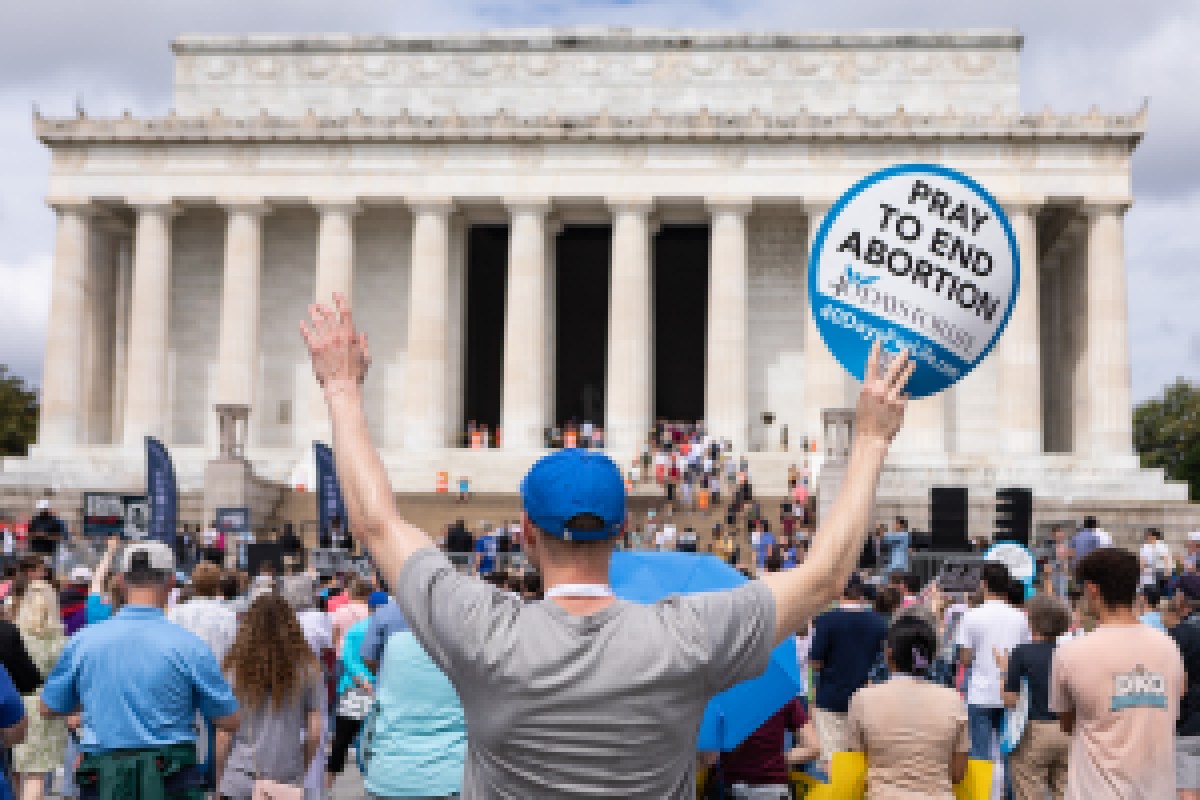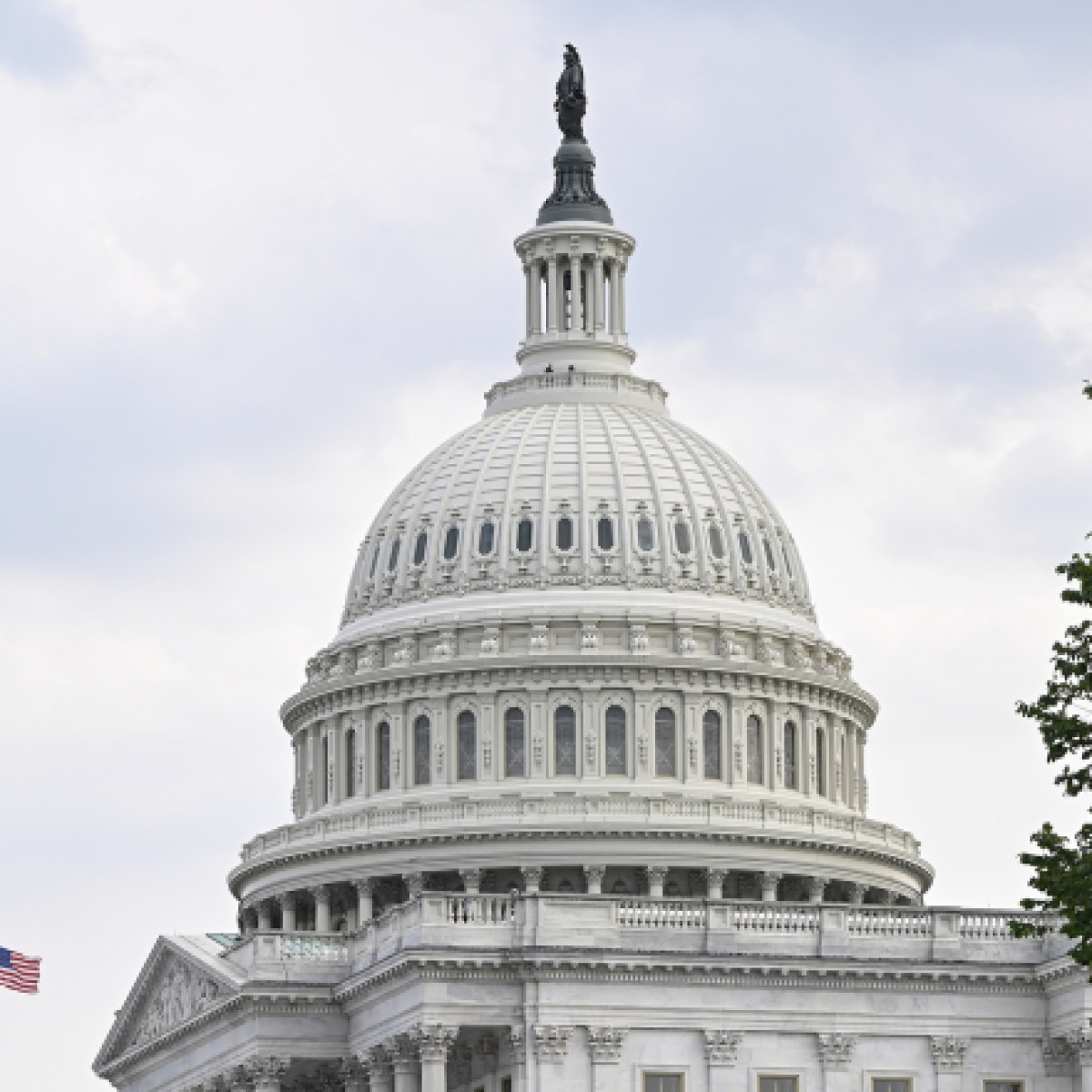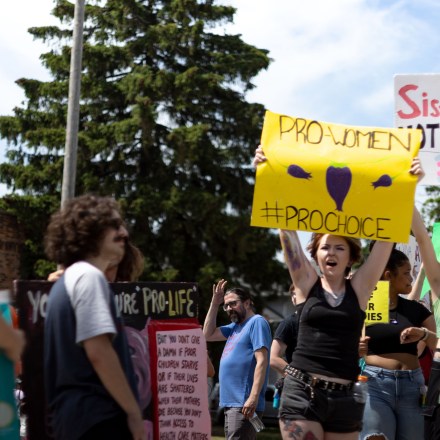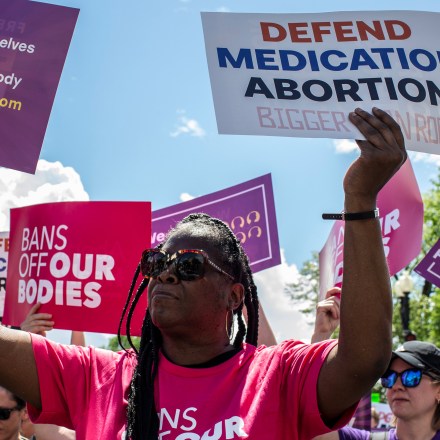
Anti-abortion activists participate in a “Celebrate Life Day” rally at the Lincoln Memorial on June 24, 2023, in Washington, D.C.
Since the Supreme Court demolished the right to abortion in Dobbs v. Jackson Women’s Health Organization last June, the GOP has been trying to douse the fury of reproductive justice defenders and dam the torrent of their victories at the polls.
They’ve been failing.
At first, they banked their hopes on changing the subject, from the pesky question of women’s existential equality to the rising prices of gas and groceries. That hopey-changey stuff did not work out for them in the 2022 midterms. After that, Republicans turned to election interference, trying to subvert reproductive freedom initiatives by making it harder to amend state constitutions. In both Ohio and Arkansas, that tactic lost big.
Where they couldn’t stand in the way of steamrolling support for a pro-abortion measure, they returned to a time-honored tactic: lying — replacing the texts of proposed constitutional amendments on the ballots with their own, baldly inaccurate summaries. The ruse didn’t stop Ohio voters from enshrining abortion rights in their constitution by healthy margins this week. Missouri’s attorney general is trying the same trick in anticipation of a 2024 initiative. But advocates are fighting back, and he looks weak.
So, after 18 months of watching its take-no-prisoners politics repudiated at the polls, the anti-abortion movement has adopted a new look: “moderation.” The centerpiece of this strategy is a “limit” on terminations after 15 weeks’ gestation, which proponents describe as “reasonable” and “commonsense.”
The first test of anti-abortion neo-moderation was in Virginia this week. Republican Gov. Glenn Youngkin campaigned hard for his party members, leading his pitch with a “15-week bill.” His star candidate — and perhaps the most persuasive propagandist of this approach, after presidential contender Nikki Haley — was three-term state Sen. Siobhan Dunnavant. “Abortion should remain legal up to 15 weeks. After 15 weeks there should be reasonable exceptions, for rape, incest, life of the mother, and severe fetal anomalies,” said the OB-GYN and mom in a campaign ad. Claiming (falsely) that her state “allows for abortion up to the moment of birth,” she called current policy “unnecessary, extreme, and heartbreaking.” The Washington Post characterized Dunnavant’s approach as “a nuanced stance on a polarizing topic.” But, it turned out, not a convincing one.
Youngkin’s goal was to flip the Democrat-controlled Senate and, with an all-red statehouse, pass a conservative agenda that would set him up as Donald Trump’s 2028 heir apparent. Instead, the lower house flipped blue, and the Dems held the Senate — thanks, in part, to Dunnavant’s loss. In a term-limited seat, Youngkin is a lame duck. And neo-moderation took a hit.
Despite the setback in Virginia, the GOP is unlikely to ditch this strategy. National-level candidates are adopting it, following the lead of the influential Susan B. Anthony Pro-Life America, whose president, Marjorie Dannenfelser, has vowed that SBA will “oppose any presidential candidate who refuses to embrace at a minimum a 15-week national standard to stop painful late-term abortions while allowing states to enact further protections.”
In the second Republican presidential primary debate, in September, Florida Gov. Ron DeSantis endorsed the 15-week federal limit. In the third, on November 8, South Carolina Sen. Tim Scott did too. Haley has said she’d sign one but has also hedged, citing the unlikelihood of such a bill getting through Congress. In the debate she espoused, as usual, “consensus.” The next day, one New York Times commentator called her “sensible and realistic on abortion.” Another thought Haley’s stance would “connect with both primary and swing voters.”
Of course, not everyone in the movement is on board. Abortion abolitionists such as Students for Life of America and Kentucky Sen. Rand Paul will accept nothing less than constitutional rights for every fertilized egg. National Right to Life Committee President Carol Tobias has called the 15-week limit a “mistake,” because it would permit most abortions, which occur before that time.
Given the sensitivities of the anti-abortion base, it’s not surprising that many candidates are remaining as vague as possible. On ABC News, for instance, Rep. Nancy Mace, R-S.C., spoke of a “middle ground,” which she defined as “some sort of gestational limits, not at nine months but somewhere in the middle.”
Against this thrust from the right, the left has not yet parried strategically. So far two responses have dominated. One is simply to assert that 15 weeks is not a limit or a standard. “Now they’re pushing for a 15-week ‘standard’ on abortion — which, to be clear, would be a ban,” wrote Jessica Valenti in the New York Times. “A ban is a ban,” said Schuyler VanValkenburg, Dunnavant’s Democratic opponent in Virginia, “and she’s proposing a ban.”
The other is to call the 15-week proposals undemocratic, because Americans show high levels of support for abortion in all or most cases. In an editorial condemning a North Carolina law shortening the period of legal abortion from 20 weeks’ gestation to 12, the Charlotte Observer referred to polls finding majority support in the state for the rights the old law protected. The ban’s partisans call it “mainstream,” said the Observer, but it “is anything but.”
These arguments have some strengths. Indeed, a 15-week limit does ban abortions after 15 weeks, which are now legal, for instance, in Virginia. A federal 15-week limit would slash abortion rights in the 24 states that have either left legal abortion in place or succeeded in protecting or expanding those rights. In another interview, VanValkenburg clarified: “If something’s legal and then it becomes illegal, it’s a ban.”

Republican presidential candidates Nikki Haley and Ron DeSantis, center, have both voiced support for a 15-week national abortion ban.
Majorities do support abortion in all or most cases, and that support has reached record highs since Dobbs, including in red states. But here’s the rub: The “most cases” that two-thirds of Americans support fall in the first trimester — before 12 weeks. Might this squishy pro-choice bloc look at a federal 15-week limit as a step in the right direction — a law protecting some abortion rights, when we’ve never had a federal law explicitly protecting any?
Denying America’s nuanced — and yes, moderate — views on abortion does not magically make them more pro-abortion. Calling a law that doesn’t ban all abortions a ban is not effective argument. Facing a suddenly warm and fuzzy-looking opponent, how should defenders of reproductive justice proceed?
Seize the enemy’s most reliable weapon: fear.
What’s moved voters is not the exhortations of our side but the viciousness of theirs.
The purpose of moderation is to calm. If total bans, election interference, and transparent lies are fire, the 15-week limit is aloe. If you can’t win the other side over, you can soothe the middle into inaction. With electoral margins so slim, you don’t need many middle-of-the-roaders to roll over and go back to sleep on Election Day.
But if moderation calms, fear mobilizes. In fact, what’s moved voters thus far is not the exhortations of our side but the viciousness of theirs. Republicans have always been better at deploying fear than Democrats. The joke on them is that Americans have been pushed, trembling in fear, to the left.
Our job is to wake up the sleepy middle by scaring the bejesus out of them.
The first task is to disarm the disarming: expose the currently moderate as only temporarily moderate.
Dunnavant has lovely bedside manner. But her record belies the sweetness. NARAL Pro-Choice Virginia gave her 0 percent ratings in her first two terms, 25 percent in the third, and 17 percent in 2022. If she’d won, there’s no knowing what she’d have supported.
Susan B. Anthony Pro-Life America is leading the charge on 15 weeks. But it is patently speaking to this moment. Its website declares that it “exists to end abortion” and that “every human life begins at conception.” Where does a 15-week limit fit in that vision? The organization’s dishonesty and expediency will attract and encourage more dishonesty and expediency. Case in point: Ron DeSantis. A month before he signed onto SBA’s pledge, he averred that abortion policy should be left to the states. To cover his bases, he signed two different bans in Florida: in April, six weeks; in September, 15.
Another peril to publicize is the one blowing from Washington. If the neo-moderates pull in enough middle-of-the-road voters in national elections, the gusts will build to a Category 5 hurricane. Not least of the coming destruction: A Republican Senate and White House will finish filling the federal bench with extreme right-wing judges, who hold lifetime appointments.
Anti-abortion activists, including many of these judges, never intended to stop at states’ rights to decide on abortion. Federalism was only a way station in the quest for the true grail, a nationwide ban superseding all state legal frameworks. Hence, the challenge in Texas federal courts to the Food and Drug Administration’s approval of the abortion drug mifepristone. Justice Samuel Alito’s majority opinion in Dobbs was the first brick in an edifice of precedent that could uphold the federal criminalization of abortion. If the court hears the FDA case, a ruling in the challengers’ favor might be the next.
Remember that the subject of Dobbs was Mississippi’s 15-week ban. But Mississippi was not defending a 15-week ban. Two weeks after the ruling freed it to do so, the state criminalized all abortion.
These arguments are mostly rational. They’re meant to invoke fear by unmasking the truth, exposing the pussycat’s claws. The left trusts reason more than emotion; the abortion rights movement has used facts to counter the other side’s lies, even as facts lose their persuasive potency. Truth is still good political discourse. But politics are 90 percent emotional.
The right’s advantage in stirring political emotion is the willingness to lie. When there’s not enough to fear (or the wrong things are fearsome, like the climate crisis), the right invents monsters: the Mexican rapist, the woke gender ideologue or critical race theorist, the abortion profiteer. The beauty of an imaginary opponent is that it can morph and multiply to fulfill any brief.
Many on the left consider the political use of fear to be intrinsically dishonest and generative only of division and violence. They see instrumentalizing fear as fearmongering, the antithesis of progressive values, including the value of truth. But right now, both truth and fear are on our side. In case you haven’t noticed, reality is terrifying.
The most terrible of realities — the one that has driven millions to the polls to vote to protect reproductive rights — is the permanent loss of bodily freedom. And that is the post-Roe endgame: the enshrinement of fetal personhood, which is the denial of the personhood of already born pregnant people.
If bodily autonomy is a fundamental right, it is nonnegotiable.
Roe had its flaws, starting with the wobbly foundation on privacy rather than freedom. But the ruling changed the status of the pregnant and potentially pregnant in more than one monumental way. “While we conventionally think of Roe as the decision that defined the constitutional right to not be pregnant, it also delineated — and was in fact the first articulation of — rights a woman has while pregnant,” wrote Lynn Paltrow, Lisa Harris, and Mary Faith Marshall in the American Journal of Bioethics. That lasted 50 years.
In a short 18 months, their predictions about looming abortion bans have come hideously true: “Anyone who becomes pregnant … will become newly vulnerable to legal surveillance, civil detentions, forced interventions, and criminal prosecution.” As they warned, the red states have created “a new class of persons for whom fundamental constitutional rights don’t apply.”
Dobbs turned 25 million women of reproductive age into second-class citizens. But coast-to-coast criminalization will make of every uterus-bearing person what the philosopher Giorgio Agamben called a “margizen,” a nominally legal citizen of a nation-state, who lives both inside society and outside it. The margizen — the prisoner, the homeless person, the migrant — exists in a “state of exception,” their rights suspended until such time as full social and legal citizenship can be attained. It may never be attained.
Those who have been denied abortions, particularly when they or their fetuses are sick or dying, already have felt themselves slip from the inside to the outside. Those who live within the historical legacies of unfreedom and exclusion have felt it before, and the Dobbs decision reanimates that feeling. If you have not been there yet, imagining yourself or your daughter or partner in that place should be enough to displace comfort with legitimate anxiety. Enough to wake the complacent.
Fifteen weeks is not a step in the right direction. It is a step rightward, and downward. But even to be drawn into haggling over six weeks or 15, 26, or 40 sets us plunging. If bodily autonomy is a fundamental right, it is nonnegotiable. No compromise can be reached. From 15 weeks the distance down is immeasurable, and of that we should all be very afraid.










